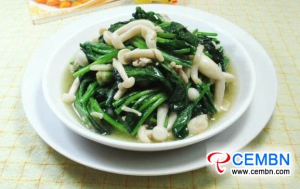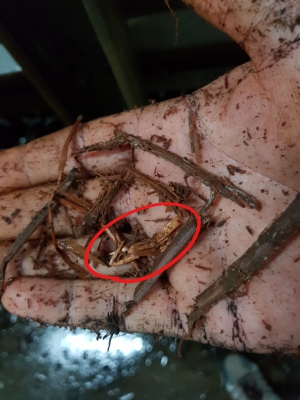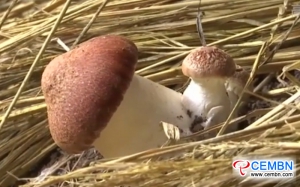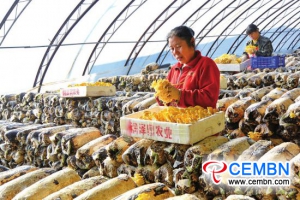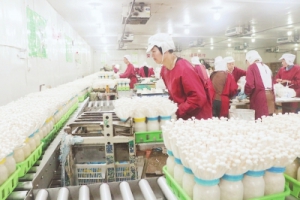
Mushroom Matter
Welcome on our platform. Why MUSHROOM MATTER? Because mushrooms play an important role in our lives as well in business. Our goal is to bring the world the very latest mushroom news with the upmost care to support the positioning of our beloved Mushroom.
Preserve structure during composting
Longer pre-wetting of straw to preserve structure during mushroom composting
In my 'Pre-wet' blog, I already wrote about the importance of pre-wetting for good mushroom substrate. In this blog, I would like to discuss the structure of straw. I often hear customers say: "We are shortening the pre-wetting time because the structure of the compost is too short." But I disagree with this statement. Why? Read all about it in this blog.
If the straw has a shorter pre-wetting period, the micro life is less likely to damage the hard wax layer of the compost. The idea is that the straw and, therefore, the compost stays longer.
The problem lies in the machines that process the straw. Proper mixing is done by rapidly rotating shafts that pick up the compost and spread it mixed, to optimise blending. Hard straw breaks in these machines, however, which results in shorter structure.
Further opening up the straw, by way of a longer pre-wet or by adding an additional dose of water a few days after the start of the pre-wet, softens the straw. Softer straw breaks less easily and therefore retains more structure.
Conclusion
We can compare straw with spaghetti. If we want to put spaghetti in a small pan, we can break it and it will fit, but the structure becomes shorter. Allowing the spaghetti to warm up a little first makes it soft, so you can get all the spaghetti into the pan without breaking it.
Nutrients
If the growing room is filled while there are still yellow straw sprigs in the compost that have not been opened up, this is a problem. The water is not absorbed by the compost; and in addition, the mycelium literally cannot grow in the straw. This prevents the mushrooms from getting any nutrients from the straw. You also continue to see the same yellow straw sprigs in the compost in the second/third flush. Non-opened compost only provides filling weight, but the mycelium cannot feed the mushrooms from it.
Mark den Ouden
More question about composting? Follow the Master class of Mushroom Office, given by Mark den Ouden and John Peeters. From 29 April – 4 May, see more information, by click on this link.
In recent years, Guan’nan County, Jiangsu Province of China insists on grasping mushroom farming as the leading industry that propels the structural adjustment of agricultural industry and pushes the course of modern and high-efficiency agriculture. In 2018, gross output on fresh mushroom totaled 600,000 tons, output value came to over 5.5 billion CNY in Guan’nan County. In addition, the same year, mushroom farming also created over 22,000 job opportunities and helped them earn the annual average incomes of over 35,000 CNY. Mushrooms cultivated within the county include King oyster, Button, Enoki, Straw, Pleurotus geesteranus and so on.
Nowadays, mushroom industry is leading the rapid growth trend in Guan’nan County, degree of industrialized mushroom clustering ranks first in China while output value is in amplification year by year.
“Our company has introduced mushroom culture from America, and a full set of technical plant for Triple Fermentation from Holland, annual utilization volume on rice and wheat straw and other biomass resources reaches 20 tons, compost input in each square meter can yield at least 35 kg of fresh mushrooms, and the technology is on the cutting edge of the world,” introduces general manager of Jiangsu Yuguan Modern Agricultural Technology Co., LTD passionately.
Prosperous mushroom industry generates 1.4 billion CNY of annul output value in this county
On March 18, Stropharia rugosoannulata cultivated in Zhenzhuang Village, Yutai County, Jining City, Shandong Province of China are in desirable fruiting period.
“It is the first year that i start trial farming of Stropharia rugosoannulata, picking time was started in the middle of January, now, the market price for fresh Stropharia rugosoannulata is at 16 CNY per kg,” introduces owner of the base, adding that to estimate by the present market quotation, 32,000 CNY of incomes could be generated from 2000 kg of Stropharia rugosoannulata, after removing the cost on investment and management, pure profits in each mu of land reach 20,000 CNY or so.
In recent years, on the basis of strengthening Auricularia polytricha industry, Yutai County also introduces Morel mushroom, Stropharia rugosoannulata and other 10 new and superior mushroom varieties in a bid to intensify the risk resistance to mushroom market and drive farmers to increase incomes and grow rich. Up to now, over 6800 mushroom greenhouses have been established within Yutai County, annual output on various fresh mushrooms comes to over 462,600 tons while output value totals 1.448 billion CNY.
Recently, in Jilin Runzeyuan Edible & Medicinal Mushroom Cooperative, Pleurotus citrinopileatus show good growth trend.
“Our cooperative occupies 54 mu of area, now, it absorbs 10 greenhouses, equipped with Spawn Cultivation Room, Inoculation Room, Sterilization Room and Raw Material Workshop. During the cultivation process, any chemicals are not added, mushroom products are widely accepted by consumers,” introduces chief of Jilin Runzeyuan Edible & Medicinal Mushroom Cooperative warmly, adding that in the future, they plan to develop mushroom condiment which effectively lowers blood fat. Meanwhile, bonded particles made from waste mushroom bags are in planned exploration so as to realize ecological and environmental protection and innocent treatment.
Pleurotus citrinopileatus is tender in taste, rich in odour and abundant in nutrition. Meanwhile, it is packed with the medicinal value on nourishing and strengthening the body.
Pleurotus citrinopileatus sells like hot cakes in international market while its production and benefit are higher than those of other agricultural products.
BIOLOGICAL CHARACTERISTICS of PLEUROTUS CITRINOPILEATUS
1. TEMPERATURE: Pleurotus citrinopileatus is categorized into medium and high temperature, temperature difference stimulation is not required for fruiting of Pleurotus citrinopileatus. Mycelia of Pleurotus citrinopileatus adapt to the temperature range of 5-30 degrees Celsius, the optimal temperature range for the growth of mycelia and sporocarps is respectively at 20-26 and 22 degrees Celsius.
2. HUMIDITY: Suitable water content for substrate is 60%-65%. During the formation period of sporocarps, the required relative air humidity is 90%-95%.
3. ILLUMINATION: Illumination is not required during the growth period of mycelia, mycelia lead quick growth speed in dark condition while 150-160 LUX of scattered light is needed during the formation and growth phase of sporocarps.
4. AIR: Pleurotus citrinopileatus is aerobic, carbon dioxide promotes the growth of mycelia. During the formation phase of primordia, sufficient CO2 guarantees the normal growth of mushroom buds.
5. PH VALUE: During the growth period, the optimal PH Value is 6.5 while 6.0-6.5 is preferred during the fruiting phase.
RECOMMENDED FORMULAS OF MASTER CULTURE & PRODUCTION SPAWN:
A: Wheat Kernels 67%, Sawdust 30%, Water Content of 50%-55%.
B: Sawdust 78%, Bran 20%, Gypsum Powder 1%, Cane Sugar 1%, Water Content of 55%.
C: Cottonseed Hull 78%, Wheat Bran 20%, Gypsum Powder 1%, Cane Sugar 1%, Water Content of 60%.
RECOMMENDED FORMULAS OF SUBSTRATE:
A. Corncob 78%, Corn Powder 20%, Gypsum Powder 1%, Superphosphate 1%, Water Content of 60%-65%, PH Value of 6.0-6.5.
B. Cottonseed Hull 47%, Sawdust 30%, Bran 18%, Cane Sugar 1%, Calcium Carbonate 1%, Water Content of 60%-65% and PH Value of 6.0-6.5.
Farmers turn Oyster mushroom growing into a cash cow
Recently, in mushroom base located in Chaoyang Village, Shuangpai County, Hunan Province of China, Oyster mushrooms are in picking time.
“By now, the first batch of Oyster mushroom (2500 kg) has been sold out by the market price of 8-10 CNY per kg,” introduces one of villagers excitedly. “Under the support of local government, 19 rural households were driven to embark on mushroom growing, during the cold time, daily fruiting volume reaches 250-400 kg while it reaches 1000-1500 kg after temperature rises.”
By the end of 2019, 320,000 nutrient bags are expected to be developed in Chaoyang Village while the estimated per capita incomes hit above 10,000 CNY through mushroom industry.
Smart factory yields superior White fungi
On March 8, White fungi produced in Fujian Xiangyun Biotechnology Development Co., LTD are in picking phase.
“The optimal temperature for the growth of White fungus (Tremella) is 22-25 degrees Celsius. In the past, growers could only follow the seasonal cultivation. And, in traditional growing rooms, manual operation is seen on regulation of temperature, humidity and ventilation, which indicates low production efficiency. Besides, as the high oxygen-consuming variety, White fungus holds strict requirements to ventilation, humidity and illumination, nowadays, smart mushroom factory greatly supports and guarantees the optimum growth of White fungus,” said marketing manager of Fujian Xiangyun Biotechnology Development Co., LTD passionately.
Fujian Xiangyun Biotechnology Development Co., LTD is known as the key provincial leading enterprise in agricultural industrialization, by means of the management of Internet of things and traceable supervision, the company intensifies the safety of products’ quality. Up to now, White Fungus Broth, White Fungus Juice and other deep-processed products have been developed, products gain good popularity by consumers in Korea, Thailand and other countries. In 2018, gross output on dried White fungus came to over 1600 tons while output value reached at least 80 million CNY within Xiangyun Company.
On March 6, there is a busy scene in production workshop operated by Fujian VANCHEN Mushroom Biotechnology Inc, workers are busy with the picking and packing of all kinds of mushroom on automatic production lines.
Located in Xinei Village, Changqiao Town, Fujian Province of China, Fujian VANCHEN Mushroom Biotechnology Inc is known as the key leading enterprise of agricultural industrialization. The company holds the planned investment of 1 billion CNY, by now, over 500 million CNY of Third-phase investment has been completed in 550 mu of gross area. Nowadays, daily output on Enoki mushroom, Brown Shimeji mushroom, White beech and other varieties comes to 110 tons, annual output capacity ranks the first of Fujian Province while quality of mushroom is in China’s leading position.
About Fujian VANCHEN Mushroom Biotechnology Inc:
With two branches which refer to Fujian VANCHEN and Nanjing JINVANCHEN, VANCHEN Biotechnology Group mainly produces Enoki, Shimeji, White beech and other mushrooms by industrialized (factory-mode) production pattern and internationally-advanced core technology.
Fujian VANCHEN Mushroom Biotechnology Inc covers 388 mu of land and it is the key project of Fujian Province. Within the company, mushroom factory holds graceful environment and fresh air, by referring to Japans GMP Standard and advanced technology and equipment, Phase One of the project holds 6800 tons of annual production capacity on White beech and Shimeji mushroom, Phase Two shows 20,000 tons of annual output on Enoki mushroom while Phase Three was put into production as a national large-scale R&D and production base of industrialized mushroom.
Five Product Concepts: Green, Environmental, Organic, Safe and Superior.














